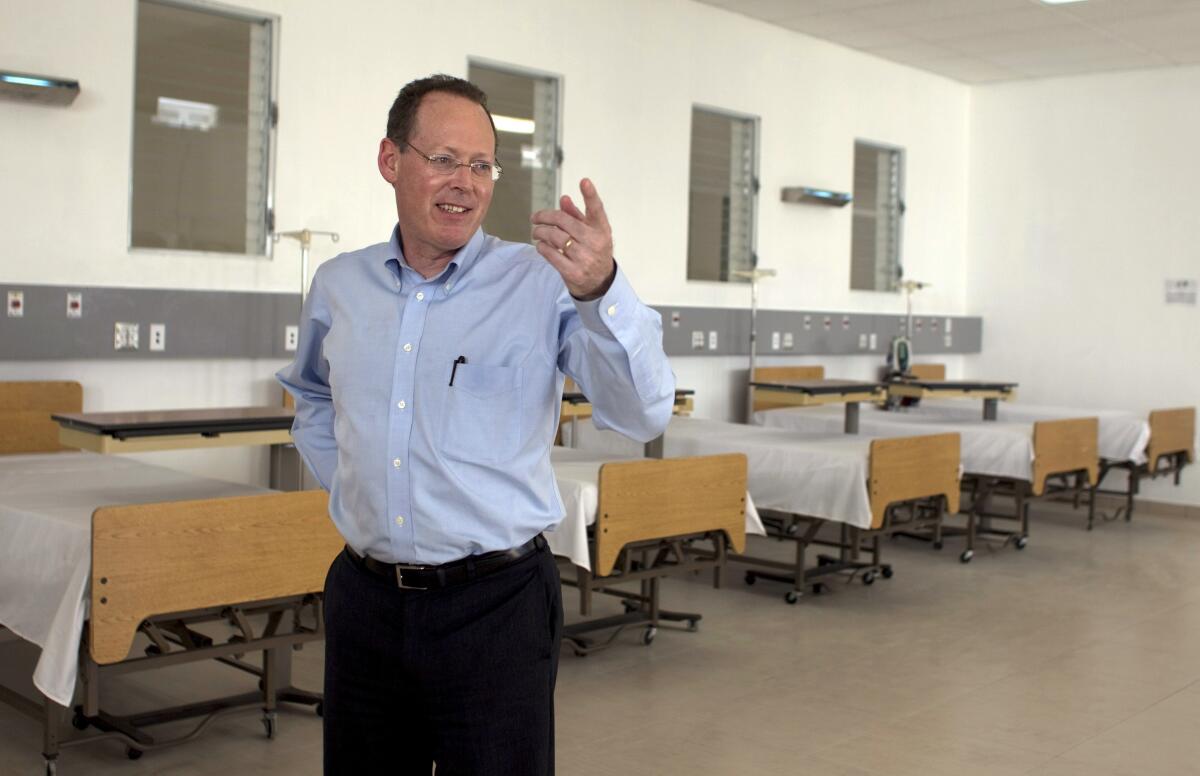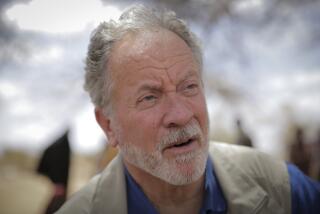Dr. Paul Farmer, global healthcare pioneer who provided aid to millions, dies

- Share via
Dr. Paul Farmer, a U.S. physician, humanitarian and author renowned for providing healthcare to millions of impoverished people worldwide and who co-founded the global nonprofit Partners in Health, has died at age 62.
The global health organization confirmed Farmer’s death on Monday, calling it “devastating” and noting he unexpectedly died in his sleep from an acute cardiac event while in Rwanda, where he had been teaching.
Farmer was a professor of medicine at Harvard Medical School and chief of the division of global health equity at Brigham and Women’s Hospital. He wrote extensively on health, human rights and social inequality, according to Partners in Health.
“A compassionate physician and infectious disease specialist, a brilliant and influential medical anthropologist and among the greatest humanitarians of our time — perhaps all time — Paul dedicated his life to improving human health and advocating for health equity and social justice on a global scale,” wrote George Q. Daley, dean of Harvard University’s Faculty of Medicine, in a statement.
Partners in Health, founded in 1987, said its mission is “to provide a preferential option for the poor in healthcare.” The organization began its work in Cange, a rural village in Haiti’s central plateau, and later expanded its operations to regions including Africa, Eastern Europe and Latin America.
Pulitzer Prize-winning author Tracy Kidder, who wrote the nonfiction book, “Mountains Beyond Mountains: The Quest of Dr. Paul Farmer, A Man Who Would Cure the World,” said he traveled with the famed physician for a month as Farmer treated prisoners and impoverished people in Haiti, Moscow and Paris.
“He was an important figure in the world,” Kidder said. “He had a way of looking around corners and of connecting things. He couldn’t obviously go and cure the whole world all by himself, but he could, with help of his friends, give proof of possibility.”
One of Kidder’s strongest memories of Farmer occurred in Peru, where the doctor was treating patients with multidrug-resistant tuberculosis. Kidder recalled a woman wearing a Mickey Mouse shirt who followed them to their car, looking very shy.
With her head down, she said, “Thank you,” to Farmer in Spanish. Kidder recalled: “Paul turned, took each of her hands in his and said, ‘For me, it is a privilege,’ in Spanish.”
He added that Farmer was instrumental in getting AIDS treatments, and created various health systems around the world.
“It really humiliates the nay-sayers, who think it’s somehow OK for some people to get healthcare and others not,” Kidder said. “It just drove him nuts.”
Michelle Karshan, vice president of a nonprofit prison healthcare system in Haiti who worked closely with Farmer, said he was determined, innovative and always knew how to get around obstacles and bureaucracy.
“He didn’t take no for an answer,” she said. “He didn’t think anybody was too poor or too illiterate to be entitled to receive healthcare.”
She noted that when the World Health Organization resisted giving HIV medication to people who were illiterate in Haiti for fear they would not know when or how to take it, Farmer set up his own program and created a chart that relied on the sun’s position. He also hired people known as “accompaniers,” who would hike through Haiti’s rough mountainous terrain to make sure patients had water, food and were taking their medications.
“I’m so sad for all the people who are not going to have him in their lives. He was there for everybody,” Karshan said.
Haiti’s Prime Minister Ariel Henry praised Farmer’s work, as did former President Clinton.
“Paul Farmer changed the way healthcare is delivered in the most impoverished places on Earth. He saw every day as a new opportunity to teach, learn, give and serve — and it was impossible to spend any time with him and not feel the same,” Clinton said in a statement.
At the beginning of the COVID-19 pandemic, with thousands of cases reported daily in Massachusetts, local health departments were overwhelmed by the task of contact tracing to help slow the spread of the disease.
The state launched a contact tracing collaborative in April 2020, and asked Partners in Health to lead the initiative, which made more than 2.7 million calls to residents at a total cost of about $158 million, according to the state.
Farmer is survived by his wife, Didi Bertrand Farmer, and their three children.
More to Read
Start your day right
Sign up for Essential California for the L.A. Times biggest news, features and recommendations in your inbox six days a week.
You may occasionally receive promotional content from the Los Angeles Times.







